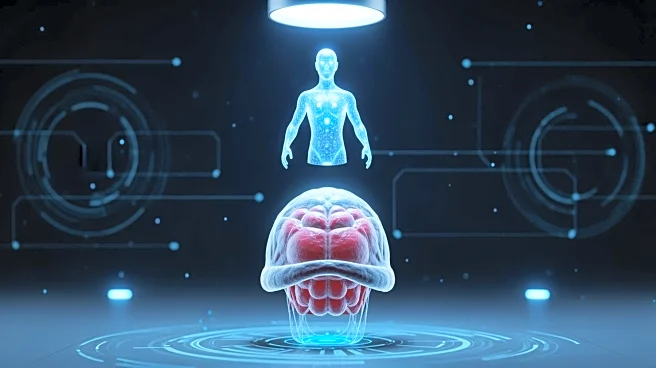What's Happening?
Dyno Therapeutics, a Boston-based genetic medicines company, has announced significant advancements in its AI-driven gene therapy initiatives. At the inaugural Genetic Agency Technology Conference (GATC)
in Boston, Dyno introduced updates to its AI agent platform, including Parser, Knowledge, and Structure agents, aimed at automating research and development workflows. These agents enhance protein design effectiveness by integrating scientific expertise into general-purpose tools. Additionally, Dyno unveiled its new Dyno-bn8 AAV vector for muscle gene therapies, which demonstrated promising results in nonhuman primate studies by achieving effective transduction at significantly lower doses than typical therapies. The company also announced a strategic manufacturing partnership with Trisk Bio, expanding its Frontiers program to facilitate the use of Dyno capsids in therapeutic development.
Why It's Important?
The advancements by Dyno Therapeutics represent a significant leap in the field of genetic medicine, particularly in gene therapy. By leveraging AI to streamline and enhance the design and delivery of therapeutic agents, Dyno is addressing critical challenges such as off-target effects and patient safety concerns. The introduction of AI agents to automate R&D processes could accelerate drug discovery and development, potentially leading to more personalized and effective treatments for genetic diseases. The partnership with Trisk Bio further strengthens Dyno's manufacturing capabilities, offering therapeutic developers access to innovative capsid technologies without incurring additional costs. This could lead to faster and more cost-effective development of gene therapies, benefiting patients with rare and complex genetic conditions.
What's Next?
Dyno Therapeutics is calling for beta testers to further refine its AI agent platform, which could lead to broader adoption and integration of AI in genetic medicine research. The company's expanded Frontiers program will continue to provide partners with access to Dyno capsids for testing in vivo, potentially accelerating the development pipeline for new gene therapies. As Dyno collaborates with strategic partners like Trisk Bio, the company is poised to enhance its manufacturing processes, potentially reducing time and costs associated with bringing new therapies to market. The success of these initiatives could pave the way for more widespread use of AI in genetic medicine, transforming the landscape of therapeutic development.
Beyond the Headlines
The use of AI in genetic medicine raises important ethical and regulatory considerations, particularly regarding data privacy and the potential for unintended consequences in gene editing. As AI-driven therapies become more prevalent, there will be a need for robust frameworks to ensure ethical accountability and patient safety. Additionally, the democratization of genetic agency, as envisioned by Dyno, could lead to broader access to personalized medicine, challenging existing healthcare models and prompting discussions on equity and accessibility in treatment options.








